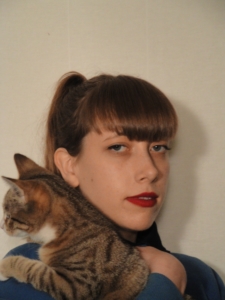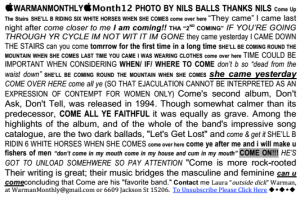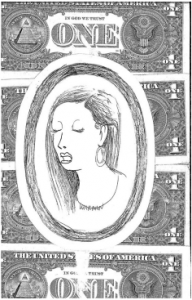
Image: Nicole DiMarco
I don’t remember where I heard about all this. I just knew about Blue Ivy and North’s mini luxury cars off the top of my head. This stuff isn’t just a matter of public record, it’s a matter of public consciousness. I don’t know what kind of car my own grandmother drives. I’ve forgotten. I hardly know any of my neighbors. But I know what Blue Ivy got for her birthday. What does this mean?
Laura A. Warman, poet, performance artist, and social experimenter, is concerned with how we experience contemporary society. In her new book of poems, How Much Does It Cost?, she dissects celebrity culture with a magnanimity and humor that manifests as a radical honesty. She seems both compelled by and dubious of the idea of celebrity. Celebrity power, a power that we’re all complicit in granting, both attracts and repulses Warman. Her poems often teeter on the brink of surrendering to these manufactured urges, but she always redeems each poem, and herself, with candor. As she joyfully admits in “5/15”, “I Never Wanted To Write Poetry I / Just Wanted To Back That Ass Up.”
She has an entertainingly ambivalent attitude toward a lot of the things that she writes about: sex, commercials, technology, nostalgia, gender, work. She approaches everything with a variety of formal techniques, but always with tenderness. Even her dry and oftentimes dark wit seems to mask a hidden noble intention: to be honest about our lives so that we can actually improve them.
I spoke to Warman about the border between pop culture and personal experience, women’s sexuality in poetry, and Australian teens on Tumblr. The interview was conducted via shared Google Doc. It has been edited for clarity and length.
Scott Beauchamp: Before we get into your poetry, you’re associated with something called The Cyberpunk Apocalypse House in Pittsburgh. What’s that?
Laura A. Warman: The Cyberpunk Apocalypse is a writers co-op that I am member of. Basically it is a giant house writers can live in for $200/month (including utilities). It also has a visiting writers program where writers can live in the house for free for a month to complete a project. The house is falling apart, has holes in the roof, doesn’t have heat, and some of the roommates are birds. It has been a community incubator and hosts reading and literary events. It also really stretches the idea of what a writer is because the residents are comic book authors, screen printers, and photographers.
How has living there influenced your poetry?
It has made me take myself seriously. It has created an audience that thinks I am a writer/artist so I must fulfill those desires. It also made me hate most comics, I’ll be honest.
A lot of the poems in your latest book, How Much Does It Cost?, explore the porous borders between pop culture and our own intimate personal experiences. I’m thinking specifically of poems like “1/MADONNA”, in which you discuss misremembering and being turned on by Madonna’s 1984 VMA performance. You often mention Kanye and the Kardashians, and a line from the poem “1/13” sort of sums up this aspect of your poetry fairly well: “In the end it is all branding.” What is your poetry saying by drawing attention to this strange nexus of the deeply personal and the cult of celebrity?
Today, not only is the personal political, the personal is celebrity. With the onset of the celebrity cheerleaders of Instagram, reality television, and Twitter, celebrity is something that can be attained through witticism and aesthetic. The deeply personal has become the public through these television programs. When I watched Kim Kardashian give birth on television I cried and felt emotionally connected to her and my vision of her as a sort of goddess. My journey into discovering celebrity and being influenced by it likely began because I was homeschooled by Evangelical Christians and did not watch television or listen to popular radio stations or read magazines. When I emerged from this cocoon in college everything I saw had a profound influence on me. I do not treat my love for celebrity as a joke, or think I am better than those on television. My interactions with celebrities is personal. Because I am just now being exposed to pop culture, it all seems to fresh fascinating.
I don’t know what my poetry is saying/ trying to say about celebrity. But I hope it is saying “I love you” OR “I respect you”. Ideally it would be saying at the same time, “I hate you” OR “I don’t understand you”. I think celebrity is the poetry of my 23-/24-year-old self. Celebrity can be packaged and sold. Poetry is creating an “I” in a similar way celebrity creates an “I” through marketing/makeovers.
Celebrity is the failure of poetry. Celebrity is a failed society. Celebrity proves that we will never be equals AND will continue to be regurgitated nothings. I am at the coffee shop and two doctors are talking about someone dying matter-of-factly that is how I feel about poetry and celebrity. Now they are talking about religion as the big “?” but I have no other metaphor for that. Poetry today is overrun by celebrities creating mediocre work. I am talking about alt-lit photo montages. I am talking about the ever-talked-about Steve Roggenbuck. The doctors are saying the only answer in Buddhism but they agree that they are both white so that cannot be.
Also, maybe (hopefully) celebrities are our chance for some sort of diffused radicalism where we can finally address societal issues before it is too late. That’s what I want. I want celebrities to be so much in the glorified forefront that they must turn around, cut down the scrim, and set themselves on fire.
So celebrity is sort of the canary in the mine as well as the mine itself? By that I mean, celebrities are not only a valuable source that you draw from, but an indication of the viability of the source itself? Your response also seems to indicate that, both personally as well as for society, you think this relationship with celebrity is temporary, that it will or must eventually change.
Yes. I think Things are going to change soon. My performance of Poetry is an attempt to make revolution. I am drawn to celebrities because they represent the failure of society. They are at once High & Low. Celebrity has become even more meaningful these days, revealing the continued unevenness of society. The more popularity/ wealth these few individuals possess the more Fame created. This, like many facets of the country, are not sustainable. But my (our?) current relationship with celebrity will only be changed when society changes/collapses (The Fire). This is what I want. Maybe I love celebrities because they represent failure. Maybe I love celebrities because I love beauty. I probably love celebrities because I love cyborgs and want gender to dissolve. Kim Kardashian specifically is an example of this.
You’re very candid about your own sexuality. But your frankness doesn’t seem like some kind of cheap attempt to shock or anything. Rather, to me it reads like an attempt to liberate sexuality from certain burdensome illusions — to free sexuality from fantasy in some ways. Is that what you’re trying to do? Is that even possible?
I am trying to do that! It may be possible! I don’t want attention because I am a female poet who has sex. I want women poets, specifically, to write about sex in a way that is freed from metaphors that constantly diffuse. Sex is important. Sex is not free just because I can have many sorts of birth control for free. Sex is: great, easy, terrifying, dangerous, meaningless, powerful. Sex is there/everywhere. People have bad sex all the time.
Are you implying that there’s a connection between metaphors and illusions? Specifically when it comes to sex, or as a general statement?
I think the link between metaphorical and women’s sexuality has been really problematic for me. One time I went to a reading and there were 4 poets (2 women 2 men). The men would not stop talking about their dicks and when the women performed they used really floral language. I don’t get why women’s sexuality is still masked by metaphors. No one seems to really know what is going on up in their vagina. I want women poets specifically to stop using metaphors when referencing their sexuality. It doesn’t make anything easier to understand it just continues the idea that vaginas are deep/scary/confusing. The poet Alta does this successfully and really changed poetry for me. I feel empowered when I am being clear. I don’t want to diffuse, I want to be.
Your work is very, very funny. There’s a skepticism that pervades everything, even to include rather strong skepticism of yourself, but it all manifests in hilarious ways. I follow a lot of Australian teens on Tumblr, which your sense of humor reminds me of. You share a really fresh feeling of incredulity at an absurd culture. What role do you think humor plays in your work?
WTF who are these Australian teens??? Thank you for comparing me to them. I think that is the nicest comparison I have received. Can you tell me more about these teens? I love teens, although I fear teens.
Humor is important! I don’t take myself completely seriously and I enjoy making jokes. My favorite sort of humor is when the audience is laughing and crying at the same time in a way that says “We are fucked/Life is great”. Humor is often the way I address the most fucked up things that have happened to me. This could mean I am afraid of complete expression or it could be the only way I can address the world. I am intimately aware of how much I suck, so jokes are the way to get past all the “UGH” vibes I got going.
If it’s true that jokes are emblematic of some repressed desire, and I’m not entirely convinced that they are, it sounds like maybe your desire is for some sort of mutual understanding or mutual magnanimity. Do you think humor is a way to be candid without being heavy?
YES. I have a deep fear of sentimentality. Humor allows me to talk about being in love or my parents without thinking that I have an answer of see things clearly. I think historically poetry was an individual teaching The Way or having a clear/profound vision. Did I already say this? Humor allows me to depict things I have seen but not present a moral code. Everything is flexible. Morality is . . .?
Some of your poems seem strongly connected to the tradition (and I think it’s been around long enough to call it a tradition) of “found-text” or “post-production” work, work that actively seeks to abolish the cult of personality that surrounds a lot of poetry. Is that what you’re trying to do with your poems that rely heavily on presentation of found material, of pop-culture rip-offs? What is the relationship between these types of poems and your more emotionally direct and personal poems?
The way I interact with celebrity and found text specifically shows that any expression is muted/made the same under capitalism. My performance of emotion is the same as Kim Kardashian or others and is not in any way more important or meaningful because I am critical of society. I want to be free from the patriarchy of poetry that claims possession of pure/beautiful thoughts or genius. Society creates thoughts as well as text.
Technology is important to these found texts. Rihanna is important. one poem is just a copy and paste of Rihanna lyrics. If it is all about branding, I think Rihanna has promoted herself in a similar way to the brand of my poetry. She sings about sex explicitly but her sex has also been labeled as problematic. The internet has been critical of her sex with Chris Brown and also is quick to claim that she possesses an STD. Her songs are a creation of so many others that seem end up expressing a muted self. Outer layer of self is penetrated on occasion in moments of hyper-reality (i.e. Chris Brown assault). My poetry is similar to that because I am taking things I hear/read/see and becoming a new person or maybe becoming another person. How Much Does It Cost? is an attempt to create an encompassing vision of a self but often reveals through diffusion. This person exists because of the market. This person exists because of the body of text she can access.
Are these cultural restraints on your identity, even just your poetic identity, inevitable or something that you’ve chosen? Like a posture that you’re exploring?
I think it is inevitable but I like to separate it from myself so it seems more created/external. There are many things that form me and write my “story” like the college I attended, the job I have, my location. These facets of my identity are chance. My identity changes as much as the speaker in my poetry changes her identity. Since I became a born-again Christian I have rapidly changed my identity. Six years ago I believe in right and wrong, I believed men and women were Born That Way and are different. Today, I believe in . . . ? I believe in myself and other people but maybe that’s the extent. So, I am always changing. My poetry is always changing. I might control some aspect of the Persona but I promise to show you the real me. I think I may not have answered your question at all.
You don’t just write poetry. What are some of the other projects that you’re involved in?
 To me, all of my projects are poetry. I do a lot of “performance art” pieces. One of my favorites was a performance I did for the Carnegie International at an event called “/Pittsburgh”. I did a powerpoint on repeat for an hour. I read the slides aloud while drinking cokes and some people even stayed for the whole thing. I also have a performance art jitney service and my monthly postcard newsletter, “WARMAN MONTHLY”. The postcard is sent out to subscribers every month; it has a portrait of myself made by a local artist and then on the backside is some sort of poem.
To me, all of my projects are poetry. I do a lot of “performance art” pieces. One of my favorites was a performance I did for the Carnegie International at an event called “/Pittsburgh”. I did a powerpoint on repeat for an hour. I read the slides aloud while drinking cokes and some people even stayed for the whole thing. I also have a performance art jitney service and my monthly postcard newsletter, “WARMAN MONTHLY”. The postcard is sent out to subscribers every month; it has a portrait of myself made by a local artist and then on the backside is some sort of poem.
 I have also recently been doing smell poetry readings where I make entire rooms smell like fish or something equally unpleasant to make the audience extremely uncomfortable during otherwise cozy readings. I don’t remember what else I do. I work at Whole Foods Market as a cashier. I’m also part of a women’s art collective, DAD PRANKS! Probs the best thing I am a part of.
I have also recently been doing smell poetry readings where I make entire rooms smell like fish or something equally unpleasant to make the audience extremely uncomfortable during otherwise cozy readings. I don’t remember what else I do. I work at Whole Foods Market as a cashier. I’m also part of a women’s art collective, DAD PRANKS! Probs the best thing I am a part of.
Scott Beauchamp is a writer and contributing editor for Full Stop who lives in New York and works at Archipelago Books. He’s a U.S. Army infantry veteran who enjoys the Grateful Dead and the Tarot.
This post may contain affiliate links.







